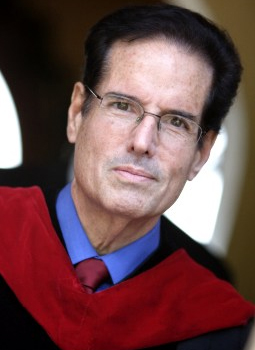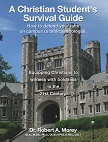DIOTREPHES THE DICTATOR
By Dr. Robert A. Morey
https://njiat.com/apologetics.html
It seems like many churches have members who insist on “being boss” and having their own way. I must confess that sometimes it is the pastor who assumes dictatorial powers and forgets that the word minister means “a servant.” But sometimes it is an officer, perhaps a longtime member of the church who thinks he or she has “seniority rights.”
Our Lord’s disciples often argued over which of them would be the greatest in the kingdom (Matt. 18:1ff). Jesus had to remind them that their model for ministry was not the Roman official who “lorded it over” people, but the Saviour Himself who came as a humble servant (Phil. 2:1ff). During my many years of ministry, I have seen the model for ministry change, and the church is suffering because of it. It appears that the “successful minister” today is more like a Madison Avenue tycoon than a submissive servant. In his hand he holds a wireless telephone, not a towel; in his heart is selfish ambition, not a love for lost souls and for God’s sheep.
Diotrephes was motivated by pride. Instead of giving the preeminence to Jesus Christ (Col. 1:18), he claimed it for himself. He had the final say-so about everything in the church, and his decisions were determined by one thing: “What will this do for Diotrephes?” He was most unlike John the Baptist who said, “He [Jesus Christ] must increase, but I must decrease” (John 3:30). The Greek verb indicates that it was the constant attitude of Diotrephes to promote himself.
Whenever a church has a resident dictator in its membership there are bound to be problems, because people who are spiritually minded will not tolerate that kind of leadership. The Holy Spirit is grieved when the members of the body are not permitted to exercise their gifts because one member must have his own way. At the Judgment Seat of Christ, we will discover how many hearts have been broken and churches destroyed because of the arrogant “ministries” of people like Diotrephes. Consider what this man was doing.
He would not receive John (v. 9). It is incredible to think that a church leader (Diotrephes may have been an elder) would not have fellowship with one of our Lord’s own apostles! How much Diotrephes could have learned from John! But Jesus Christ was not preeminent in his life, therefore Diotrephes could afford to treat the aged apostle this way.
Why did Diotrephes reject John? The obvious reason seems to be that John challenged the man’s right to be dictator in the church. John was a threat to Diotrephes, because John had the authority of an apostle. John knew the truth about Diotrephes and was willing to make it known. Satan was at work in the church because Diotrephes was operating on the basis of pride and self-glorification, two of the devil’s chief tools. If John appeared on the scene, Satan would be the loser.
He lied about John (v. 10a). The phrase prating against us with malicious words means “bringing false and empty charges against us.” What Diotrephes was saying about John was sheer nonsense, but there are people who love to hear such talk and who will believe it! Apparently, Diotrephes had made these accusations against John at one of the church meetings when John was not present to defend himself. But John warned that the day would soon come when he would settle accounts with Diotrephes the dictator.
Christians must be careful not to believe everything that they read or hear about God’s servants, particularly those servants who have a wide ministry and are well known. I have quit reading certain publications because all they print are undocumented accusations about people whose ministries God is blessing in a singular way. I mentioned a certain publication to a friend of mine one day, and he said, “Yes, I know the editor quite well. He’s like a blotter: he takes everything in and gets it backward!” We would all do well to filter these reports through Philippians 4:8.
He rejected John’s associates (v. 10b). Diotrephes would not even receive the other brethren because they were in fellowship with John! It was “guilt by association.” It is impossible to practice this kind of “separation” with any degree of consistency, because nobody can always know all that he needs to know about what his brother is doing! If I refuse to fellowship with you because you have fellowshipped with somebody I disapprove of, how do I know the extent of your fellowship? How can I keep track of what you have done? A person would need a computer and a full-time staff if he ever hoped to do a good job of keeping his associations pure!
Scripture makes it clear that we should have no fellowship with apostates (we studied this in 2 Peter), and that we must refrain from entangling alliances with unbelievers (2 Cor. 6:14ff). We must also avoid those whose doctrinal position is contrary to Scripture (Rom. 16:17–19).
This does not mean that we cooperate only with those believers who interpret Scripture exactly as we do, because even good and godly people disagree on some matters such as church government or prophecy. All true Christians can agree on the fundamental doctrines of the faith and, in love, give latitude for disagreement on other matters.
However, to break personal fellowship with a brother because I disagree with his circle of friends is, to me, going beyond Scripture. Diotrephes rejected John, and then rejected the believers associated with John! But he went even further.
[1]
Church “dictators” are dangerous people but, fortunately, they are easy to recognize. They like to talk about themselves and what they have “done for the Lord.” They also have the habit of judging and condemning those who disagree with them. They are experts in putting labels on other Christians and classifying them into neat little categories of their own intention. They base their fellowship on personalities, not the doctrines that are fundamental to the faith. The tragedy is that these “dictators” actually believe that they are serving God and glorifying Jesus Christ.
It has been my experience that most of the distress and division in local churches, and between churches, has resulted from personalities more than anything else. If only we would return to the New Testament principle of making the person and work of Jesus Christ our test for fellowship, rather than associations and interpretations of nonessential doctrines. But people like Diotrephes will always have their enthusiastic followers because many sincere but immature and untaught believers prefer to follow such leaders.
[2]
V.9. Not everyone shared this worthy objective, however. John stated,I wrote to the church, but Diotrephes, who loves to be first, will have nothing to do with us. The simple reference to “the church” suggests strongly that this was the church to which Gaius belonged. It sounds as if Gaius may not have known about John’s letter to the church. It may well be that Diotrephes had suppressed it and kept it from the church’s attention. Diotrephes, John observed, was motivated by a love for preeminence in the church. He was not the last church leader to be so motivated. The temptation to use a role in the Christian assembly as a means of self-gratification remains a real one that all servants of God need to resist. As a result of his personal ambitions, Diotrephes resisted the apostle’s wishes. The expression, “will have nothing to do with us,” may also be translated, “does not welcome us as guests.”
The apostle was probably thinking of Diotrephes’ refusal to accord hospitality to the traveling brethren (cf. v. 5) who came to the church (perhaps with the letter just mentioned), and he took Diotrephes’ rejection of the brothers as a rejection of himself. Quite possibly Diotrephes did not present himself as a personal opponent of John, but in rejecting John’s representatives he was rejecting John (cf. John 13:20).
V. 10. The writer, however, knew that he could deal with this matter in person. So if I come, I will call attention to what he is doing.This assertion should probably be taken as an understatement. The verb (hypomnēsō) means basically “to remind” or “to call to mind.” Here the phrase might be translated, “I will call his works to mind” with the manifest implication that Diotrephes’ works would be dealt with appropriately.
Diotrephes, the writer asserted, had been guilty of three things. First, he was gossiping maliciously about us.These words are literally “bringing false charges (phlyarōn, used only here in the NT) against us with evil (ponērois) words.” No doubt that self-willed leader did his best to tear down the reputation of those whom he was not prepared to receive (as in v. 9, the “us” may refer chiefly to John’s representatives).
But Diotrephes went beyond mere talk, wrong as that was. Not satisfied with that, he refuses to welcome the brothers. This was his second wrongdoing. His malicious prattle no doubt laid the groundwork for actual refusal of hospitality (in contrast with Gaius’ hospitality). And, third, like many other ecclesiastical dictators since his time, Diotrephes did all he could to enforce his will on others: He also stops those who want to do so and puts them out of the church. Using his self-acclaimed authority, having a prominent position (v. 9), he forced other believers to be inhospitable or, if they weren’t, even prevented them from gathering with the church.
Perhaps Gaius already knew most of these facts. It is unlikely that John was indirectly reminding him of the potential difficulties he faced in welcoming men who served the truth. But Gaius’ obvious dedication to hospitality (vv. 5-6) suggests that he was a man of some means and probably in a good position to resist the authority of Diotrephes. He would be further encouraged by John’s promise that he would deal with Diotrephes when he arrived.
V. 11. At any rate, Gaius was notto imitate what is evil but what is good.Diotrephes’ behavior was to be avoided, not copied. One’s conduct clearly reflects one’s relationship with God. Anyone who does what is good is from God.The words “from God” translate the Greek phrase ek tou theou, which occurs a number of times in 1 John (e.g., 3:10; 4:1-4, 6-7). It suggests that the source of one’s actions or attitudes is in God. Conversely, anyone who does what is evil has not seen God.With this, the statement of 1 John 3:6 should be compared (see the discussion on that verse). The assertion should not be watered down.
Evil never arises from a real spiritual perception of God but is always a product of darkness of heart and blindness toward Him. John was not questioning Diotrephes’ salvation, but hewas affirming that Diotrephes’ conduct manifested real blindness toward God. Gaius was to be careful to shun such an experience as this.
[3]
Verses 9-11
I. Here is a very different example and character, an officer, a minister in the church, less generous, catholic, and communicative than the private Christians. Ministers may sometimes be out-shone, out-done. In reference to this minister, we see,
1. His name—a Gentile name: Diotrephes, attended with an unchristian spirit.
2. His temper and spirit—full of pride and ambition: He loves to have the pre-eminence. This ferment sprang and wrought betimes. It is an ill unbeseeming character of Christ’s ministers to love pre-eminence, to affect presidency in the church of God.
3. His contempt of the apostle’s authority, and letter, and friends. (1.) Of his authority: The deeds which he doeth contrary to our appointment, prating against us with malicious words. Strange that the contempt should run so high! But ambition will breed malice against those who oppose it. Malice and ill-will in the heart will be apt to vent themselves by the lips. The heart and mouth are both to be watched. (2.) Of his letter: “I wrote to the church (v. 9), namely, in recommendation of such and such brethren. But Diotrephes receiveth us not, admits not our letter and testimony therein.’’ This seems to be the church of which Gaius was a member. A gospel church seems to be such a society as to which a letter may be written and communicated. Gospel churches may well expect and be allowed credentials with the strangers who desire to be admitted among them. The apostle seems to write by and with these brethren. To an ambitious aspiring spirit apostolical authority or epistle signifies but little. (3.) Of his friends, the brethren he recommended: Neither doth he himself receive the brethren, and forbiddeth those that would, and casteth them out of the church, v. 10. There might be some differences or different customs between the Jewish and Gentile Christians. Pastors should seriously consider what differences are tolerable. The pastor is not at absolute liberty, nor lord over God’s heritage. It is bad to do no good ourselves; but it is worse to hinder those who would. Church-power and church-censures are often abused. Many are cast out of the church who should be received there with satisfaction and welcome. But woe to those who cast out the brethren whom the Lord Christ will take into his own communion and kingdom!
4. The apostle’s menace of this proud domineerer: Wherefore, if I come, I will remember his deeds which he doeth (v. 10), will remember to censure them. This seems to intimate apostolical authority. But the apostle seems not to hold an episcopal court, to which Diotrephes must be summoned; but he will come to take cognizance of this affair in the church to which it belongs. Acts of ecclesiastical domination and tyranny ought to be animadverted upon. May it be better agreed to whom that power belongs!
II. Here is counsel upon that different character, dissuasion from copying such a pattern, and indeed any evil at all: Beloved, follow not that which is evil, but that which is good, v. 11. Imitate not such unchristian pernicious evil; but pursue the contrary good, in wisdom, purity, peace, and love. Caution and counsel are not needless to those who are good already.
Those cautions and counsels are most likely to be accepted that are seasoned with love.Beloved, follow not that which is evil. To this caution and counsel a reason is respectively subjoined. 1. To the counsel: Follow that which is good; for he that doeth good (naturally and genuinely doeth good, as delighting therein) is of God, is born of God. The practice of goodness is the evidence of our filial happy relation to God. 2. To the caution: Follow not that which is evil, for he that doeth evil (with bent of mind pursues it) hath not seen God, is not duly sensible of his holy nature and will. Evil-workers vainly pretend or boast an acquaintance with God.
[4]
We know little about Diotrephes. His name means “foster child of Zeus,”19 which suggests that he is of Greek descent. He is a leader within the local church and turns his leadership position to selfish advantage. John writes that Diotrephes “loves to be first.” Instead of serving the church, this proud person is egotistic and refuses to recognize superior authority.
He himself desires to rule the church. Accordingly, Diotrephes rejects the apostolic supremacy of John. He acts contrary to the injunction of Jesus, “Whoever wants to become great among you must be your servant, and whoever wants to be first must be your slave” (Matt. 20:26–27). Incidentally, even though John introduces himself as “the elder” (v. 1), he exercises authority of a level higher than that of an elder.
John mentions that Diotrephes “will have nothing to do with us.” Note that he uses the pronoun us possibly to include the friends who send greetings to Gaius. Perhaps some of these friends were leaders with authority (compare, for example, the use of the first person plurals we and us in I John 1:1–5). However, Diotrephes refuses to respond to John’s counsel, ignores his correspondence, and breaks the bonds of Christian fellowship. And if John intends to pay him a visit, Diotrephes will not welcome him. Diotrephes does so not because of a doctrinal dispute but out of personal ambition.
[5]
So if I come, I will call attention to what he is doing, gossiping maliciously about us. Not satisfied with that, he refuses to welcome the brothers. He also stops those who want to do so and puts them out of the church.
By writing the short statement, “So if I come,” John informs Diotrephes about his impending visit, but he provides no details about the time of his arrival. John intends to visit the congregation to call attention to the behavior of Diotrephes. Indirectly he contrasts the activities of Gaius (v. 5) with those of Diotrephes. Gaius applies the principle of love for God and his neighbor; Diotrephes adheres to the principle of selfish love. John lists the activities of Diotrephes:
a. “[He is] gossiping maliciously about us.” That is, Diotrephes is making unjustifiable accusations against John and his companions because he resents John’s apostolic authority. Therefore, he tries to undermine John with malicious gossip. In fact, the word gossip in Greek is descriptive for bubbles that appear momentarily and disappear. They are useless. The term, then, implies that the evil words Diotrephes utters are empty and meaningless (consult I Tim. 5:13). Nevertheless, the offense is an undisguised violation of God’s explicit command, “You shall not give false testimony against your neighbor” (Exod. 20:16; Deut. 5:20). A leader in the local congregation, Diotrephes stands condemned as a violator of God’s law.
b. “Not satisfied with that, he refuses to welcome the brothers.” Not only are Diotrephes’ words vicious; his deeds are equally reprehensible. He willfully breaks the rules of Christian hospitality by refusing to receive missionaries sent out to proclaim the gospel. By denying them shelter and food, he hinders the progress of the Word of God. In brief, Diotrephes is thwarting God’s plans and purposes and consequently he faces divine wrath.
c. “He also stops those who want to do so.” Diotrephes goes one step further and prevents members of the church from showing hospitality to traveling missionaries. We infer that he is trying to hinder the believers from receiving the missionaries and attempting to punish them for opening their doors to God’s servants.
d. “And puts them out of the church.” Diotrephes places before the believers a choice: either side with me against John or receive the missionaries and be excommunicated. The parallel to this situation is the excommunication of the man born blind (John 9:1–34).
[6]
____________________________________________________________________
[1]Wiersbe, Warren W.: The Bible Exposition Commentary. Wheaton, Ill. : Victor Books, 1996, c1989, S. 3 Jn 9
[2]Wiersbe, Warren W.: The Bible Exposition Commentary. Wheaton, Ill. : Victor Books, 1996, c1989, S. 3 Jn 9
cf. confer, compare
v. verse
NT New Testament
vv. verses
e.g. exempli gratia, for example
[3]Walvoord, John F. ; Zuck, Roy B. ; Dallas Theological Seminary: The Bible Knowledge Commentary : An Exposition of the Scriptures. Wheaton, IL : Victor Books, 1983-c1985, S. 2:913
[4]Henry, Matthew: Matthew Henry’s Commentary on the Whole Bible : Complete and Unabridged in One Volume. Peabody : Hendrickson, 1996, c1991, S. 3 Jn 9
19 Thayer, p. 152.
[5]Kistemaker, Simon J. ; Hendriksen, William: New Testament Commentary : Exposition of James and the Epistles of John. Grand Rapids : Baker Book House, 1953-2001 (New Testament Commentary 14), S. 396
[6]Kistemaker, Simon J. ; Hendriksen, William: New Testament Commentary : Exposition of James and the Epistles of John. Grand Rapids : Baker Book House, 1953-2001 (New Testament Commentary 14), S. 397






































